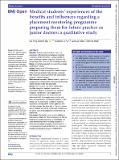Files in this item
Medical students’ experiences of the benefits and influences regarding a placement mentoring programme preparing them for future practice as junior doctors : a qualitative study
Item metadata
| dc.contributor.author | Ng, Ka Ying Bonnie | |
| dc.contributor.author | Lynch, Siobhan Mary | |
| dc.contributor.author | Kelly, Jacquie | |
| dc.contributor.author | Mba, Obinna | |
| dc.date.accessioned | 2020-01-30T10:30:03Z | |
| dc.date.available | 2020-01-30T10:30:03Z | |
| dc.date.issued | 2020-01-14 | |
| dc.identifier | 266038703 | |
| dc.identifier | bb117534-757d-4acb-b108-4dd4bdfc99a7 | |
| dc.identifier | 85077942138 | |
| dc.identifier | 000519306600221 | |
| dc.identifier.citation | Ng , K Y B , Lynch , S M , Kelly , J & Mba , O 2020 , ' Medical students’ experiences of the benefits and influences regarding a placement mentoring programme preparing them for future practice as junior doctors : a qualitative study ' , BMJ Open , vol. 10 , e032643 . https://doi.org/10.1136/bmjopen-2019-032643 | en |
| dc.identifier.issn | 2044-6055 | |
| dc.identifier.uri | https://hdl.handle.net/10023/19385 | |
| dc.description | Funding: During the time that this research was performed, KYBN was an NIHR Academic Clinical Fellow. | en |
| dc.description.abstract | Objective: To study medical students’ views and experiences of the benefits and influences regarding a mentoring programme aimed at preparing them for future practice as a doctor during their Obstetrics and Gynaecology (O&G) placement in a UK teaching hospital. Design: A qualitative approach, employing focus groups and thematic analysis. Setting: Single-centre UK Teaching hospital. Participants: Thirteen undergraduate medical students at the University of Southampton who had completed their standard 8-week placement in O&G and had been assigned a mentor throughout. Main outcome measures: Medical students’ experiences and perceptions of the benefits and influences of having a mentor throughout their O&G placement. Results: From our data, four central themes were identified: integration, feedback, seniority and expectations. Students found mentorship useful for integration into the team, and an opportunity for constructive feedback on their clinical skills and professional skills for example, communication and team-working. Seniority and the level of contact of their mentor was the main reason for differing mentoring experiences: although senior mentors spent less time with their mentees, they were able to offer more careers advice. Students felt that the mentors and mentees were not always clear on the expectations of the mentoring programme. Conclusions: Mentorship may be a useful addition to help prepare students for future clinical practice. Mentor training may improve consistency of experiences. This study demonstrates that a mentoring programme is deliverable and widely accepted by medical students in a clinical placement such as O&G, and may have wider benefits if introduced on a regional/national level. | |
| dc.format.extent | 8 | |
| dc.format.extent | 552046 | |
| dc.language.iso | eng | |
| dc.relation.ispartof | BMJ Open | en |
| dc.subject | Mentoring | en |
| dc.subject | Medical Education | en |
| dc.subject | Qualitative | en |
| dc.subject | LB Theory and practice of education | en |
| dc.subject | NDAS | en |
| dc.subject.lcc | LB | en |
| dc.title | Medical students’ experiences of the benefits and influences regarding a placement mentoring programme preparing them for future practice as junior doctors : a qualitative study | en |
| dc.type | Journal article | en |
| dc.contributor.institution | University of St Andrews. School of Medicine | en |
| dc.contributor.institution | University of St Andrews. Education Division | en |
| dc.identifier.doi | 10.1136/bmjopen-2019-032643 | |
| dc.description.status | Peer reviewed | en |
This item appears in the following Collection(s)
Items in the St Andrews Research Repository are protected by copyright, with all rights reserved, unless otherwise indicated.

